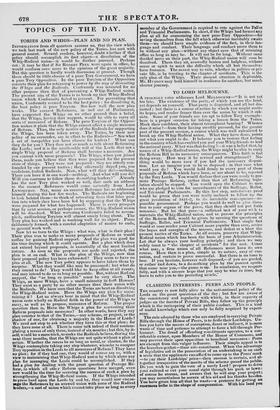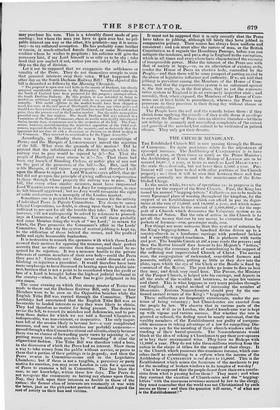CLASHING INTERESTS : PEERS AND PEOPLE.
THE country is now fully alive to the anti-national policy of the Lords on the great questions of the day ; but few are aware of the consistency and regularity with which, in their capacity of judges on the merits of Private Bills, they follow up the principle which is the mainspring of their public conduct. This is a kind of useful knowledge which can only be fully acquired by experi- ence.
The rule adopted by those who are employed in carrying Private Bills through the House of Peers, is to bribe their Lordships. Un- less you have the means of corruption, direct or indirect, it is mere waste of time and patience to attempt to force a bill through Par- liament. The dread of offending constituents operates, to a con- siderable extent, upon Members of the House of Commons, and may prevent their open opposition to beneficial measures : Peers are exempt from this vulgar influence. Their simple appeal is to the breeches-pocket—their sole constituent. When the advantage of legislative aid in the prosecution of an undertaking is on such a scale that the applicants can aflbrd to come up to the Peers' mark —to say their Lordships' price—then success is certain, and al- together irrespective of the merits of the scheme quoad the public. Do you wish to gain the vote of a needy Lord ? propose to drive your railroad or cut your canal right through his park or lawn: of course be storms, and swears that he will stop your project ; you may nevertheless be secure of his aid and his thanks besides. You have given him all that he wants—a pretence for getting an enormous bribe in the shape of compensation. With his land you May purchase his vote. This is a tolerably direct mode of pro- ceeding ; but where the man you have to gain over has i no pal- pable interest one way or the other, it is prudent—nay it s neces- sary—to try collateral corruption. He has probably some brother or cousin, or much-attached female friend, or some Newmarket creditor whom he wishes to propitiate: his solicitor will give the necessary hint, if my Lord himself is so silly as to be shy : take heed that you neglect it not, unless you can safely defy his Lord- ship on the day of division.
Let it not be supposed that we exaggerate the selfishness or venality of the Peers. They do not themselves scruple to avow that personal interests sway their votes. What happened the other day on the South Durham Railway Bill? The object of this bill is described as follows by the Morning Chronicle.
" The proposal to open new coal fields in the county of Durham, has already attracted considerable attention in the Metropolis. Several local railways in the North of England have been projected for this impose; amongst others, the South Durham Railway. By this project, it was intended to bring to market an additional supply of excellent coal, to an amount of :300,000 tons annually. This useful ..Vition to the market would have been shipped at notch less cost, at the new port of Hartlepool, than from any other port ; and would have been raised more cheaply, and therefore would have been sold at less price, than the present coal in the London market. But the noble monopolists prevailed over the free traders. The South Durham Bill was referred to a Committee of the house of Commons, where its merits were rigidly investigated during twenty days, at enormous cost to the promoters of the bill. The Com- mittee, however, notwithstanding the interested opposition of the titled coal- owners, reported decidedly in favour of the measure, and so decisively that the opponents did not dare to risk a discussion or division on its third reading in the Commons. They reserved its assassination for the Upper Assembly."
Accordingly, on Monday there was a large assemblage of Peers ; and the Marquis of LONDONDERRY moved the rejection of the bill. What were the grounds of his motion? Did lie pretend that the inhabitants of the district through which the railway was to pass would be injured by it ?—No. That the people of Hartlepool were averse to it ?— No. That there had been any breach of Standing Orders, or unfair play of any sort on the part of the promoters of the bill ?—No. But, said the noble Marquis, it will injure my property ; and therefore I call upon the House to reject it. Lord WHARNCLIFFE added, that the bill did not go upon the principle of giving sufficient compensation to those through whose property the railway was to pass. The bill, like every other similar measure, must have empowered Lord WHARNCLIFFE to appeal to a Jury for compensation, in case he felt himself aggrieved ; but no Jury would recognize the right of noble coal-owners to a monopoly of the London market. -
Sometimes one is puzzled to discover the reason for the activity of individual Peers in Private Committees. The desire to annoy Liberal Corporations, no doubt, is strong upon them ; but it is not sufficient to account for all the trouble they take. The mystery. however, will not unfrequentlf be solved by reference to proceed- ings in Committees of the Commons. You will there probably find some Member doing the work of " my Lord ;" in return for which, the Peer promotes the Commoner's affair in the Lords' Committee. In this way the system of mutual jobbing is kept up, to the edification of those behind the scenes, and the profit of noble and right honourable freebooters.
It is instructive to remark the openness w;th which these Lords avowed their motives for opposing the measure, and their perfect security that no other reasons than those assigned could be re- quired for its rejection. It was a measure hostile to the private interests of certain members of their own body—could the Peers then pass it? Certainly not : they never could dream of esta- blishing so injurious a precedent. It would therefore have been mere surplusage to have discussed its bearing upon the public inte- rest. because that is not a point to be considered when the profit or loss of a Lord is brought before the highest judicial tribunal in the country—when, in fact, a Peer has to give judgment in his own cause.
The same evening on which this strong muster of Tories was made to throw out the Durham Railway Bill, only three or four Members were to be seen on the Opposition benches while the English Tithe Bill was carried through the Committee. Their Lordships had ascertained that the English Tithe Bill was as favourable to landed interests as any they were likely to obtain. They had therefore no motive for being present. The desire to revise the bill, to correct its mistakes and deficiencies, and to per- form those duties for which we are told a Second Chamber is indispensable, was non-existent, or inoperative. The only impor- tant bill of the session likely to become law—a very complicated measure, and one in which mistakes are probably numerous— passed through a thin Committee almost sub silentio, simply because there was no chance of forwarding party views by rejecting it, or putting money into noble pouches by " amending" it after the oligarchical fashion. The Tithe Bill was therefore voted a bore, in the discussion of which the Peers had no interest. Show them a way to take money from the public without service, or prove to them that a portion of their gettings is in jeopardy, and then the Peers swans in Committee-rooms and in the Legislative Chambers; but if there is not a tangible, a pecuniary or party motive for exertion, you may scour London in vain for a quorum of Peers to examine a bill in Committee. This has been the case, to our knowledge, within these few days. The Peers do not recognize the community as having any claims upon them. Nay, they look upon their interests as hostile to those of the nation : the former class of interests are constantly at war with the latter, just as the pickpocket portion of mankind regard the rest of society as their foes and victims. It must not be supposed that it is only recently that the Peers have taken to jobbing, although till lately they have jobbed in comparative privacy. Their course has always been uniform and consistent ; and you must alter the nature of man, or the British Constitution as it regards the Hereditary Peerage, before you can mitigate the insolence, and put a stop in England to the corruption, which in all times and everywhere have characterized the exercise of irresponsible power. Make the interest of the Peers one with that of society at large,—or, as an alleviation of existing evils, render the House of Peers an elective body, controlled by the People,—and then there will be some prospect of putting an end to the abuse of legislative influence and authority. Uwe are told that jobbing is prevalent among the Members of the House of Com- mons, and that the representative system is no safeguard against it, the fair reply is, in the first place, that as yet the represen- tative system in England is in an extremely imperfect state ; and secondly, that, when exposed, the Members of the House of Com- mons are at least liable to punishment, whereas the Peers may persevere in their practices to their dying day without shame or risk of castigation.
The People have the evil and the remedy before them : if they shrink from applying the remedy—if they really deem it sacrilege to convert the House of Peers into an elective chamber—let them not indulge in unmanly and unavailing complaints of the extent and growth of the mischief, but submit to he victimized in patient silence. They only get their deserts.



























 Previous page
Previous page